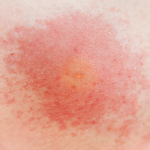
In a new study published in Nature Genetics, Northwestern Medicine® and Tel Aviv University scientists have found that a structural defect in skin cells can contribute to allergy development, including skin and food allergies, traditionally thought primarily to be a dysfunction of the immune system.
The finding is related to the team’s identification of a new rare genetic disease, called “severe dermatitis, multiple allergies, and metabolic wasting,” or SAM, caused by mutations in the molecule desmoglein 1.
“Desmoglein 1 is best understood as the ‘glue’ that holds the outer layer of human skin together,” said Kathleen Green, PhD, Joseph L. Mayberry, Sr., Professor of Pathology and Toxicology at Northwestern University Feinberg School of Medicine. “Historically, the molecule was mainly believed to have a structural role. This adhesion between cells contributes to the physical barrier that regulates water loss and also acts as the body’s major defense against environmental elements. But there are a large number of molecules that form this barrier, distributed in a highly-patterned manner, prompting our team to hypothesize that they do more than just mediate adhesion.”
Green’s group at Feinberg worked with an international team that analyzed clinical data from two families, combined with genetic analysis including next-generation DNA sequencing, and light and electron microscopy, among other techniques. They found that when desmoglein 1 does not properly function or does not exist, the resulting barrier disruption can affect the immune response, and consequences can be severe.
“This work is also significant because it suggests that in addition to impairing the physical barrier, loss of desmoglein 1 may more directly regulate expression of genes that control the immune response and contribute to allergy,” says Green. “Conceptually, it allows us to build on previous studies and make conclusions about the importance of other structural proteins in the skin barrier.”
Green notes that the finding, combined with recent published data, could eventually lead investigators to discover further connections between defects in structural molecules and less severe allergies such as atopic dermatitis, eczema, and more common food allergies.
This study was carried out by an international consortium, using patient material from the paper’s senior corresponding author Eli Sprecher, MD, PhD, director of dermatology at Tel Aviv University, Israel. Northwestern’s portion of the work was supported by the National Institutes of Health’s National Institute of Arthritis and Musculoskeletal and Skin Diseases (AR41836 and the Skin Disease Research Center P30AR057216).






